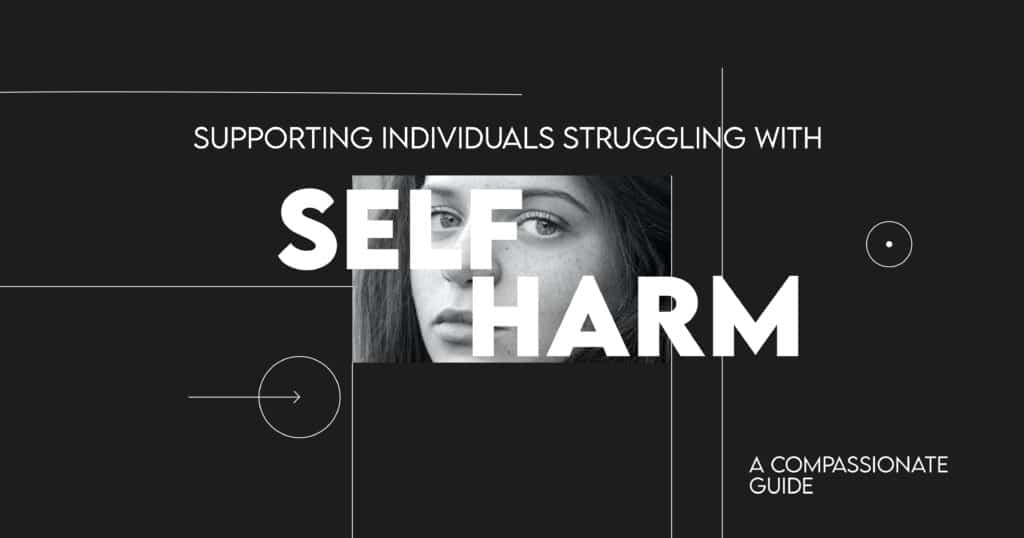
Self-harm is a complex and often stigmatized issue that affects many individuals worldwide, and offering support to those struggling is crucial. Before delving into how to effectively provide help, it is essential to understand what self-harm entails and its underlying causes.
What is Self-Harm? Understanding the Practice
Self-harm, also known as self-injury, refers to the deliberate act of causing physical harm to oneself as a means of coping with emotional pain, distress, or overwhelming feelings. It may involve cutting, burning, scratching, hitting, or other similar actions. The act of self-harm should not be mistaken for a suicide attempt, as individuals often engage in self-injury as a way to manage their emotional turmoil or regain control.
Causes: Unraveling the Emotional Turmoil
Several factors can contribute to self-harm, and understanding these underlying causes is vital in offering effective support.
- Emotional Pain: Self-harm can be a result of emotional pain that becomes overwhelming, leading individuals to seek relief or distraction through physical pain.
- Coping Mechanism: Some individuals turn to self-harm as a coping mechanism, as it provides temporary relief or acts as an outlet for their emotional distress.
- Communication and Control: Self-harm can serve as a way for individuals to communicate their pain, distress, or unmet needs when they struggle to express their emotions verbally.
- Mental Health Disorders: Mental health conditions such as depression, anxiety, borderline personality disorder, and post-traumatic stress disorder are linked to self-harm. Acknowledging and addressing these underlying disorders is essential while providing support.
How to Support Someone Struggling with Self-Harm
Supporting individuals struggling with self-harm requires compassion, understanding, and access to appropriate resources. Here are some crucial steps to take when offering assistance:
1. Establish Trust and Open Communication
Creating a supportive and non-judgmental environment is paramount to helping someone struggling with self-harm. By offering a listening ear, showcasing empathy, and respecting their confidentiality, you can foster trust and encourage open communication.
2. Educate Yourself
To provide effective support, it is essential to educate yourself about self-harm. Educate yourself on the topic’s intricacies, misconceptions, and available interventions to better equip yourself in providing informed assistance.
3. Approach with Empathy
When discussing self-harm, it is vital to approach the conversation with empathy and avoid passing judgment or making assumptions. Try to place yourself in their shoes, understanding their pain, and offering unconditional support.
4. Encourage Professional Help
While offering support is essential, it is equally important to encourage the individual struggling with self-harm to seek professional help. Mental health professionals, such as therapists or counselors, can provide specialized interventions and strategies tailored to their unique needs.
5. Provide Alternative Coping Mechanisms
Assist the individual in developing healthier coping mechanisms to replace self-harm. Encourage them to explore creative outlets, physical activities, mindfulness techniques, or journaling as strategies to channel their emotions and relieve distress.
6. Be Mindful of Triggers
Recognize that certain situations or triggers can intensify the urge to self-harm. Work together with the individual to identify these triggers and create a plan to avoid or cope with them effectively.
FAQs: Answering Unanswered Questions
Q: Is self-harm attention-seeking behavior?
Self-harm is not primarily attention-seeking; it is often a desperate call for help and a coping mechanism for emotional pain.
Q: What should I do if I discover someone engaging in self-harm?
It’s essential to approach the situation with empathy. Express your concern, offer support, and gently encourage them to seek professional help.
Q: Can self-harm be cured completely?
With appropriate support, help, and intervention, individuals can find healthier ways to cope, manage their emotions, and recover from self-harm.
Empowering Support and Hope
In conclusion, supporting individuals struggling with self-harm requires empathy, understanding, and a non-judgmental approach. By fostering open communication, encouraging professional help, and suggesting alternative coping mechanisms, we can play an active role in their journey toward healing and provide hope for a brighter future.
As you embark on this journey, it is essential to remember that supporting individuals with self-harm struggles is not a burden but an opportunity to make a positive difference in someone’s life. Revival Mental Health is a premier resource and intensive mental health treatment center serving men and women in Orange County, CA. Our clients receive personalized care twenty-four hours daily, overseen by our psychiatry team and doctorate or master’s-level clinicians. Together, we can create a safe and nurturing environment for those who need our support.




